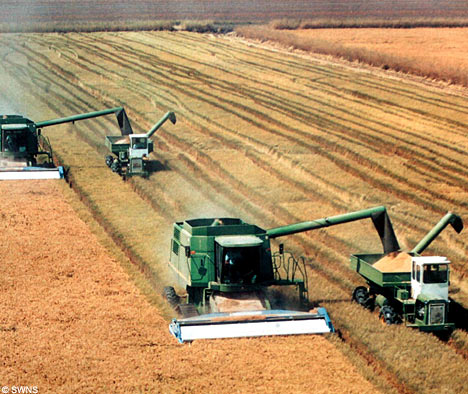
THE contribution of agriculture, currently at 23.5 per cent of the gross domestic product (GDP), can be increased with active coordination of public and private sectors. The need is to give agriculture sector top priority. Pakistan has not been self-sufficient in food production for decades. The farmers in barani areas are heavily dependent on the seasonal June-September monsoon rains for irrigating crops. Deficient rains and continuous drought during the last many years have caused tremendous losses to agriculturists. Low rainfall also contributed to reduced flow in rivers and reduced supply of water for irrigation. Among others, water shortage is the main factor contributing to low farm productivity.
Dwindling land and water resources, stagnation in the yield of major crops, ill-trained farm labour, poor infrastructure, wasteful irrigation methods, traditional farming techniques, lopsided marketing system and above all implications of WTO regime are main issues and challenges facing an outdated agriculture sector. The task of tackling all these issues and managing agriculture in the future cannot be adequately addressed by the public sector alone.Combined strength of the multi-agency system in which the private corporate sector, farmers’ organisations, cooperatives, non-governmental organisations, professionals, self-help groups, input dealers and suppliers, media and information technology can each contribute to address divergent issues.Infusion of modern management practices in farm sector to boost productivity is important to enable farmers to move farm subsistence to market-driving farming that requires changes in crop selection, cultivation, harvesting, marketing, transportation and adoption of new technologies.
Adoption of new technology is also important to convert farmers’ work into capital. Subsistence farmers produce food to sustain them only and new technology will enable them to produce surplus. New technology would give farmers more choice and help them plan cultivation in a demand rather than supply-driven environment. Modern techniques for plant protection measures are required for effective control of diseases, insects and pests to avoid crop losses.Private investment to arrest a decline in farm sector and spur economic growth is crucial. In the forthcoming budget, it is desirable to offer massive incentives to the farm sector to boost output. Farming community has serious concerns at the neglect of agriculture by different governments and the private sector in the past decades. There is a strong need of accelerating the rate of growth of agriculture sector. Unfortunately, there has been a deceleration in the growth of this sector in the past decades.
Private investment could be helpful in arresting the problems of irrigation system. The current irrigation methods are labour intensive, wasteful of water and require improvement in infrastructure. Traditional irrigation system is causing tremendous percolation and seepage losses. The farmers are unaware of the new technologies for efficient irrigation methods like drip-irrigation and micro-irrigation. Availability of implements and new technology will have profound impact in improving irrigation efficiency. In this direction, micro-loans can enable farmers to purchase implements and new technology.For identification and development of innovative approaches for environmentally responsible agriculture, joint efforts of local farmers, regional and national policy makers, extension agents, funding organisations, and the scientific community are required. Such kind of coordination will develop better understanding of farming issues, informed decision-making and better adoption of modern practices vital for boosting productivity. Modern farm and post-harvest practices improve product quality and profitability.
Drawbacks in the marketing system are yet to be removed. The farmers are not making real profits on their produce due to lopsided marketing system. Lack of direct market access for farmers due to heavy involvement of state-run buying agencies has also stymied growth of agriculture sector. There is a need of market-oriented reforms for broad based sustained growth in farm productivity. Market infrastructure is inadequate for easy transport of inputs from market to farms and farm produce back to market.Livestock farming has not been taken as a business. The role of private sector along with public sector is critical for making livestock farming profit-generating enterprise with special emphasis on the promotion of commercial dairy farming.Focus should be on increased productivity of livestock population, bull production and breed farming. Re-organisation of old livestock farming research centres and establishment of new ones is imperative for developing livestock sub-sector on scientific lines.







